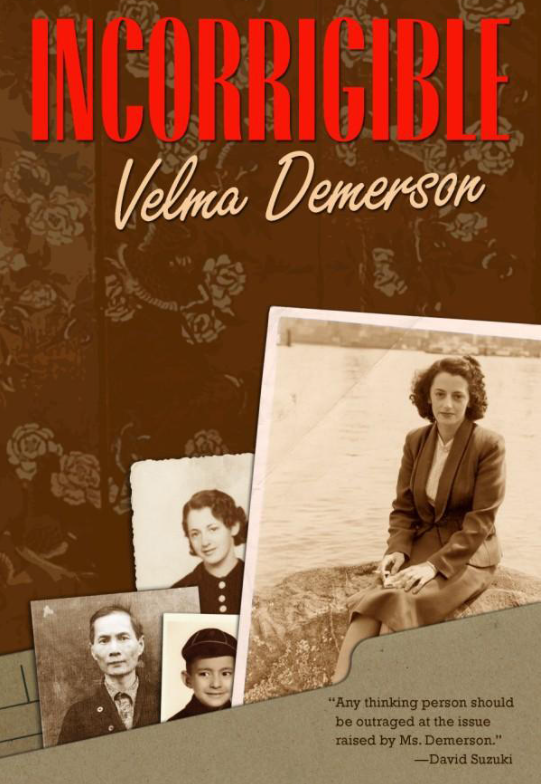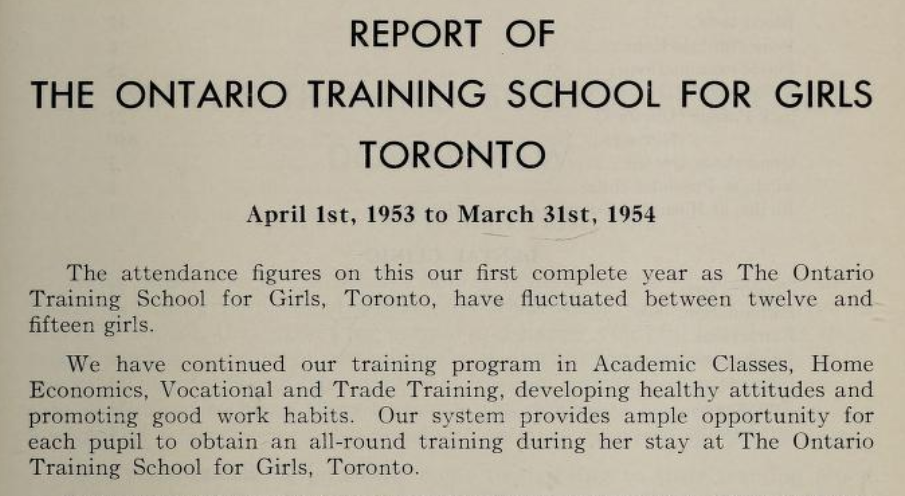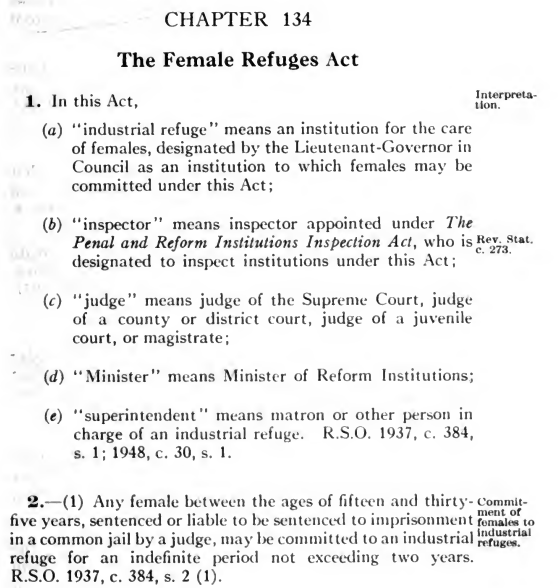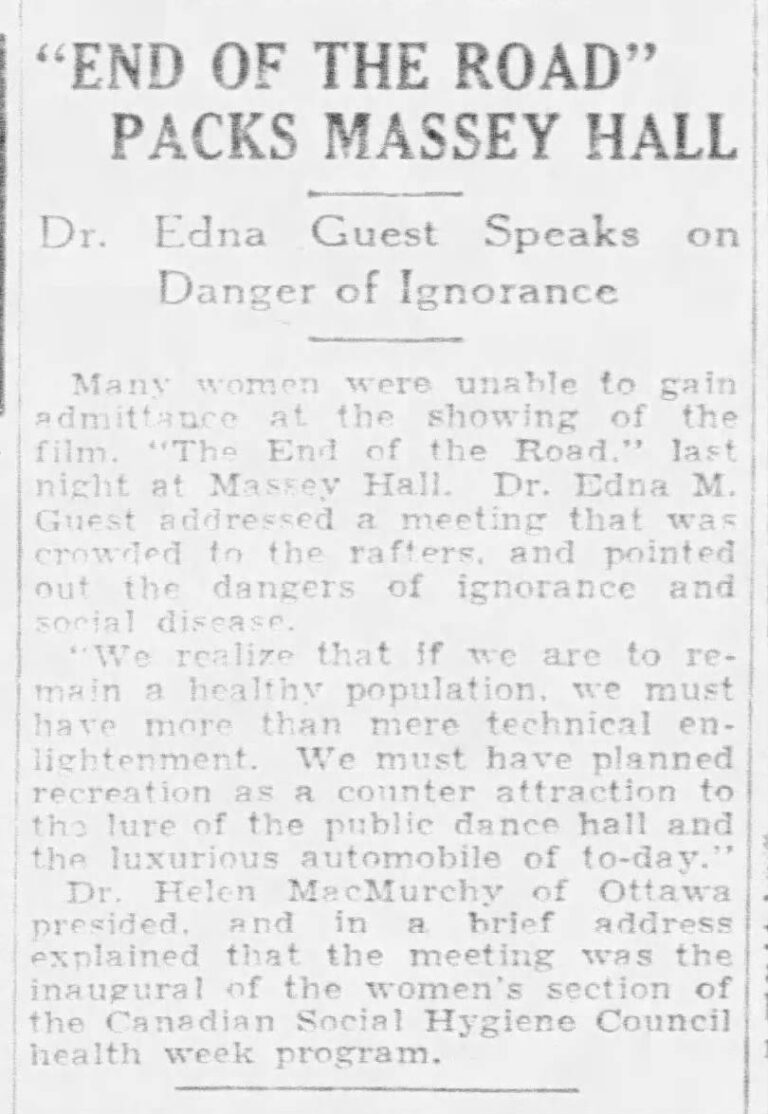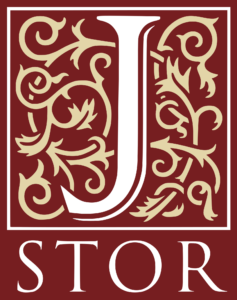This is a collection of articles, theses, books, podcasts, and chapters that explore the history of the Mercer Reformatory and other similar confined institutions. Most of these materials are available for free. There are instructions below on how to sign up for a free J-Stor account to access some articles that may be behind a paywall. The J-Stor account allows you to search a large database of academic publications.
Memoir
“On a May morning in 1939, eighteen-year-old Velma Demerson and her lover were having breakfast when two police officers arrived to take her away. Her crime was loving a Chinese man, a “crime” that was compounded by her pregnancy and subsequent mixed-race child.
Sentenced to a home for wayward girls, Demerson was then transferred (along with forty-six other girls) to Torontos Mercer Reformatory for Females. The girls were locked in their cells for twelve hours a day and required to work in the on-site laundry and factory. They also endured suspect medical examinations. When Demerson was finally released after ten months’ incarceration weeks of solitary confinement, abusive medical treatments, and the state’s apprehension of her child, her marriage to her lover resulted in the loss of her citizenship status.
This is the story of how Demerson, and so many other girls, were treated as criminals or mentally defective individuals, even though their worst crime might have been only their choice of lover. Incorrigible is a survivor’s narrative. In a period that saw the rise of psychiatry, legislation against interracial marriage, and a populist movement that believed in eradicating disease and sin by improving the purity of Anglo-Saxon stock, Velma Demerson, like many young women, found herself confronted by powerful social forces. This is a history of some of those who fell through the cracks of the criminal code, told in a powerful first-person voice.” – description from Wilfred Laurier Press on the book
Books and Articles
- Professor Constance Backhouse’s book Carnal Crimes: Sexual Assault Law in Canada, 1900-1975 explores Velma Demerson’s case in Chapter 5. The book is available for free on her website www.constancebackhouse.ca
- Donald G. Wetherell, 1979, “To Discipline and Train: Adult Rehabilitation Programmes in Ontario Prisons, 1874-1900” available through York University Histoire sociale/Social history.
- Backhouse, C. (2005). “Pleasing Appearance. . . Only Adds to the Danger”: The 1930 Insanity Hearing of Violet Hypatia Bowyer. Canadian Journal of Women and the Law17(1), 1-13.
- To read more on case of the insanity hearing of Violet Hypatia Bowyer, see page 378 in The Ontario Law Reports : Cases Determined in the Supreme Court of Ontario (Appellate and High Court Decisions), 1930-1931
- Amelia Eaton, 2023 winner of the Writing Them In Essay Contest, “Beyond System Solutions: Indigenous Motherhoods and Canadian Prison Abolition.” available through Canadian Bar Association
- Joan Sangster (2011), Through Feminist Eyes: Essays on Canadian Women’s History. The book is available to read for free here on the Athabasca University Press website
Magda Fahrni, 1997, “‘Ruffled’ Mistresses and ‘Discontented’ Maids: Respectability and the Case of Domestic Service, 1880-1914” is available to read for free on J-Stor if you register for a free account.
Peter Oliver (1996),“‘To Govern by Kindness’: The First Two Decades of the Mercer Reformatory for Women” is available to borrow on Archive.org
Theses and Dissertations
- Carolyn Strange, M.A. thesis 1983 “The Velvet Glove: Maternalistic Reform at the Andrew Mercer Reformatory for Females, 1874-1927” available through the UOttawa Library.
- Theresa L. Raymond, M.A. thesis 2018, “Sex Cells: Women’s Paths to Institutionalization in the Hospital for the Insane, Cobourg, 1902-1935” available through York University.
- Jennifer Lorraine Fraser, M.F.A. thesis exhibition 2016, “Awards: Acknowledging Absence and Situating Toronto’s Incarcerated Women – 1919-1940” available through OCAD University.
- Joseph A.G. Berkovits, PhD Dissertation 2000, “”Us Poor Devils:” Prison Life and Culture in Ontario: 1874-1914″ available through University of Toronto.
Kelly Hannah-Moffat, PhD Dissertation 1997, “From Christian Maternalism to Risk Technologies: Penal Powers and Women’s Knowledges in the Governance of Female Prisons” available through University of Toronto
Brown, M. Jennifer, M.A. thesis 1975, “Influences Affecting the Treatment of Women Prisoners in Toronto, 1880 to 1890” available
through University of Wilfred LaurierLykke de la Cour, PhD Dissertation 2013, “From “Moron” to Maladjusted”: Eugenics, Psychiatry and the Regulation of Women, Ontario, 1930s-1960s” available through University of Toronto
John Bullen PhD Dissertation 1989, “Children of the Industrial Age: Children, work, and welfare in late nineteenths-century Ontario”
available through University of OttawaJoanne Cheryl Minaker, PhD Dissertation 2003, “‘Censuring the Erring Female:’ Governing Female Sexuality at the Toronto Industrial Refuge, 1853-1939” available through Library and Archives Canada
Book Reviews
- Glasbeek, Amanda. “Punishment in Disguise: Penal Governance and Federal Imprisonment of Women in Canada, by Kelly Hannah-Moffat.” Osgoode Hall Law Journal 39.2/3 (2001) : 703-711. http://digitalcommons.osgoode.yorku.ca/ohlj/vol39/iss2/18
- Strange, Carolyn. “Book Review: ‘Terror to Evil-Doers’: Prisons and Punishments in Nineteenth-Century Ontario, by Peter Oliver.” Osgoode Hall Law Journal3 (1999) : 703-709.
DOI: https://doi.org/10.60082/2817-5069.1526
https://digitalcommons.osgoode.yorku.ca/ohlj/vol37/iss3/7
Media, Documentaries, and more
TVO interview with Constance Backhouse from 2013.
Mr. Glenn Thompson, the last superintendent of the Andrew Mercer Reformatory before they disposed of the institution provides a vignette on how the women and girls incarcerated reacted to their surroundings.
Transcript: “Here’s a vignette for you. Back in 1966, I was the superintendent of the Andrew Mercer Reformatory for Women. Can you imagine a guy doing that? They couldn’t find a lady to do it, ladies. I was there for three or four years. We disposed of that institution and built the Vanier Centre for Women in Brampton. At the Mercer Reformatory for Women, people were carving their bodies in all sorts of grotesque ways. They were mostly teenage women cutting themselves as though to cut their wrists. They weren’t really trying to kill themselves, but they were damaging their bodies and disturbing things terribly.”
Full transcript, click here: SECU-43 (December 10, 2009)
Sean Kheraj interviews Kathryn McPherson and Jennifer Stephen on gender, sexuality, and the Criminal Code.
Ontario Training Schools
Many of the criminalized and incarcerated women and girls at Mercer were previous, or current wards of Industrial Schools. By the 1930s these institutions were called Ontario Training School (OTS). In fact, at one point a wing was designated at Mercer and operated as an OTS. This wing was referred to as the Ontario Training School for Girls, Toronto. The OTS wing at Mercer opened on December 17, 1952 and closed on February 10, 1958 when a secured wing was built at the OTS in Galt. To learn more about all Ontario Training Schools watch the trailer below and visit the following website by clicking on this link called ‘Unmanageable’.
Podcast
Podcast assignment from Queen’s University undergraduate student, Annie Dowd, on the history of the Female Refuges Act. To read the full Act click on the image to the right.
Listen to the podcast hosted on the Queen’s University Department of History website: podcast link. Or, choose the option below to listen.
Films
The End of the Road (1919)
This news article announces Dr. Edna Guest (a eugenics proponent) will be speaking at Massey Hall when the film called the End of the Road is shown. Dr. Edna Guest was the staff surgeon at the Mercer Reformatory from approximately 1920-1940. To learn more about Dr. Edna Guest read the book above called Carnal Crimes: Sexual Assault Law in Canada, 1900-1975 by Professor Constance Backhouse, starting on page 117.
To view the film on the National Film Preservation Foundation website mentioned in the news article click here: The End of the Road
Film Description
The End of the Road (1919)
Sponsor: American Social Hygiene Association. Production Co.: War Dept. Commission on Training Camp Activities. Director: Edward H. Griffith. Writers: Katharine Bement Davis, Edward H. Griffith. Cast: Claire Adams, Richard Bennet. Transfer Note: Scanned from a 35mm print preserved by George Eastman Museum with support from the NFPF. Running Time: 69 minutes (silent, no music).
Wartime venereal disease prevention film intended primarily for female audiences. Sponsored by a public health organization devoted to eradicating syphilis, The End of the Road tells the parallel stories of two women, one of whom receives instruction in sexual hygiene from her mother, while the other does not.
Note: The End of the Road was originally produced for use by the military. Sometimes referred to as The Story of Life, the popular film was also put in theatrical release but withdrawn in 1919.
Criminality explained as a key concept on the Eugenics Archives website:
“During the early twentieth-century, criminality emerged as a social problem that threatened North American children, families, women, motherhood and social purity, while increasing government expenditures. Mental hygienists and eugenicists constructed criminality as a symptom of feeblemindedness and mental deficiency. Those people categorized as “morons,” the highest grade of mental deficiency, were considered to be particularly susceptible to criminal influences. A variety of eugenicists across North America held that the majority of criminals were mentally defective. This was a claim that was supposedly supported by the scientific evidence collected through family studies, and often repeated in efforts to legislate sexual sterilization programs.” Read more on criminality here
For further reading on eugenics visit the website called Eugenics Archives.
TV Shows
Lauren Robilliard, our resident genetic genealogist who often assists the descendants of criminalized and incarcerated women and girls, is a big fan of Murdoch Mysteries. Thanks to Lauren for assisting us and pointing out the latest episode regarding the Andrew Mercer Reformatory.

Murdoch Mysteries, a Canadian mystery drama that debuted in 2008, unfolds its narrative against the backdrop of Toronto during the transitional era of the 20th century. Inspired by Maureen Jennings’ Detective Murdoch novels, the series revolves around the astute Detective William Murdoch, portrayed by Yannick Bisson, stationed at House Four. Murdoch employs pioneering scientific methods and cutting-edge inventions, such as fingerprinting, to unravel mysteries. His allies in this intellectual pursuit include the resourceful Constable George Crabtree, played by Jonny Harris, the adept city coroner Doctor Julia Ogden, portrayed by Hélène Joy, and the steadfast Inspector Thomas Brackenreid, embodied by Thomas Craig.
Each episode’s narrative skillfully captures the societal nuances, and often, the historical injustices, prevalent during that era.
Murdoch Mysteries has created two episodes regarding the notorious Andrew Mercer Reformatory. Both these episodes can be viewed on demand by creating a free account on Gem at https://gem.cbc.ca/murdoch-mysteries
Once you have created an account search for Season 15 | Episode 7, called The Incorrigible Dr. Ogden
Or, click on the image below S15 | 7. The Incorrigible Dr. Ogden
Another episode of Murdoch Mysteries about the Reformatory can be located in Season 16 | Episode 18, called Vice and Virtue
Or, click on the image below S16 | 18. Vice and Virtue
Note: The Complete Murdoch Mysteries Collection by Maureen Jennings can be read on Archive.org by clicking here. It appears there may be as many as nine references to the Andrew Mercer Reformatory for Females.
Sign up for JStor
JStor is a digital library and repository that holds scholarly publications from over 2000 journal titles and primary documents. It offers free, personal accounts for research which allow you to download 100 articles per month. To register, visit the Registration Page and follow the instructions.
